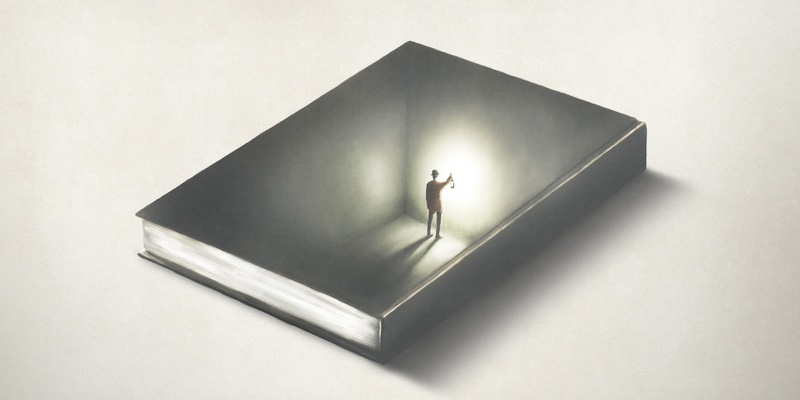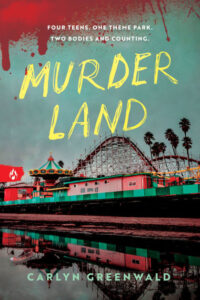When I first came out a little over five years ago, as a storyteller at heart, I dug into queer books and movies to start to process and accept myself within the history and world of queerness itself. I watched But I’m a Cheerleader and Heartstopper and read every Casey McQuiston book I could find. And I did love those stories, but I wasn’t naturally drawn to romance stories. So, despite seeing something of myself in this media, I still found myself adrift. In a way, as I always had.
When I was younger, before sexuality had even entered my mind, I submerged myself in mysteries and thrillers in every type of media I consumed from video games to TV to books. At some point, I got intellectually curious about horror, the seemingly scarier cousin of mystery/thriller. I loved the murder genres and exploring dark themes, but had shied away from horror because of my own squeamishness and easy ability to get nightmares. But the freedom of the horror genre to explore the dark and grotesque so viscerally felt like something I needed to actually experience. So, around undergrad, I decided to ease myself into horror starting with Alfred Hitchcock’s 1960 film Psycho. Despite its age, I was glued to every second, soaking in the expert atmosphere, the deft way twists were doled out to constantly ratchet up the danger, and the way simple conversations could be made uncanny time bombs. But my connection to the film never was with the characters themselves, but rather with the storytelling. There was no mirror to be found. In fact, Psycho did have queer subtext, but rather than illuminate any humanity to Norman and his mother-identity, it served to use the other as a shorthand for the unknowable and dangerous.
After Psycho, I pivoted my horror quest to reading a lot of Stephen King and being dragged to see the one or two blockbuster horror hits of the next few years (mostly Jordan Peele movies, which I loved). But about five years after I first saw Psycho and a couple years after I came out as bi, I tried to submerge myself in horror movies again with The Silence of the Lambs. And something deeper and more profound happened with that film. In some ways, I came away from my first screening feeling as though I’d seen the perfect suspense film. The terror and humanity built into Hopkins’ performance as Hannibal Lecter, the perfectly balanced suspense of Buffalo Bill’s imminent next kill with Clarice’s investigation, the way sexism twisted its way into horrors of cannibalism, skin suits, and serial murder blew me away. And finally, I did see myself in protagonist Clarice—I saw my tiny stature, I saw the wariness of men but still deep well of wanting to believe in the good of people, and, thank you Jodie Foster, I saw the implicit queerness in Clarice (and, frankly, some kind of non-heterosexuality with Hannibal Lecter). It was a film I loved that also made me feel seen.
The only issue, of course, was that The Silence of the Lambs is infamous for taking the “trans serial killer” trope and blowing it up ten times worse with Buffalo Bill. The fumbling attempt to explain Buffalo Bill’s motivations for his crimes left viewers remembering not the short exchange in which Lecter says Buffalo Bill is not trans, but rather the iconography of trans and queerness juxtaposed to a cruel and ultimately expendable maniac. It was a harmful depiction of both queer men and trans women in the 90s and won’t be getting justified any time soon. Was this the best a queer murder story lover like me could do? Love the suspense elements and writing of these dark movies and books, but have to explain to myself and strangers that I “love everything BUT”? I continued to try to watch every classic horror film I could and dig into horror books, but those more often than not didn’t contain queer characters at all (or they had one line before they died). So, diving into the horror genre and diving into queer media felt like two different journeys. Why was I not satisfied enough with the representations of queer joy in the romance movies and books being celebrated around me? Why did I enjoy them but not love them?
If one were to ask the average queer person (let alone the average cishet person) about what queer media is out there, it will likely fall into a couple buckets: the olden days tragic queer dramas (although shout out to Lovesong, my favorite sad queer movie); fluffy queer romances and romcoms; and queer coming of age stories. Yes, there have been queer storylines on major media in other genres, but those aren’t the ones that studios and publishers push. Especially when it comes to queer horror and thriller, I think it’s not only a slept on market to push, but also at a huge detriment to queer folks and dark media lovers alike.
There are so many different definitions of what diversity in queer media means, and one aspect of that exists but isn’t talked about much is taste. Just as not every person who consumes media will love romance first or love fantasy first or love horror first, the same applies to the LGBTQ+ community. I grew up loving dark media and that didn’t change when I realized I was bisexual. One major way to look at a community and say I see you, you’re important is to acknowledge that what they like matters. Just producing one piece of media featuring a marginalized protagonist in one genre won’t do it. There has to be well-crafted, empathic media across all genres. And horror and thrillers are more important now than ever.
Some people escape from the horrors of the world by escaping into joy they perhaps can’t access as easily. But others will escape by experiencing catharsis. Some people need media where they can go “Well, at least I’m not being chased by a guy with a machete.” Some people need media where they can think about dark subjects like murder, grief, taboos, and death that aren’t directly about their lives. Some people, simply put, find thrills or gore more fun than watching people kiss (or like to switch off). Especially for the marginalized who are fighting the emotional battle of a lifetime to stay sane in terrifying, often helpless feeling times, sometimes a horror book or movie where a queer character goes through hell and comes out scratched up but okay in the end is what they need to regroup and keep going. Publishers and producers need to be putting marketing money and support behind them so they reach their audiences and beyond.
The Silence of the Lambs might’ve been the first piece of media that made me feel seen as a queer person and as a horror/thriller lover, but I’m so pleased to acknowledge that there are some truly incredible writers out there producing stories that hit both parts of my and many others’ personhood with equal love. Horror writer Andrew Joseph White has never written a bad book, with The Spirit Bares its Teeth my personal favorite. Natalie C. Parker wrote one of the most poignant and terrifying YA queer horror novels of the last several years, Come Out Come Out. Chuck Tingle’s queer horror caught me right in the heart. Justine Pucella Winans writes some of my absolute favorite queer comedic mysteries and horror. Trang Thanh Tran writes some truly poignant, atmospheric YA horror. Meriam Metoui wrote one of my favorite YA motel horrors, A Guide to the Dark. Debut author Beatrice Winifred Iker wrote one of my favorite new Southern Gothic horrors out this fall, I’ll Make a Spectacle of You. Rebekah Faubion wrote what I know will be my favorite YA speculative thriller/horror of 2026, Lost Girls of Hollow Lake. And on the movie and front, films like I Saw the TV Glow, The Haunting of Bly Manor, and Yellowjackets effortlessly depict honest, complex queer characters as they go through their horrors and terrors. (And for whatever it’s worth, my favorite sapphic scene of the last year of television was on a very dark crime drama called Under the Bridge. I recommend it to everyone.)
With as many books and TV/films that are out there, I’m certain there are so many more incredible pieces of media out there. I hope to continue to see them and I can’t wait until the day that a newly out queer person, regardless of their taste in media, has dozens of different stories to make them feel seen in genres they’ve already made themselves homes in. I’m proud to be bisexual and I’m proud to be a horror and thriller lover. I can only hope my own addition to the canon will help and/or entertain whatever readers/viewers come after me.
***


















